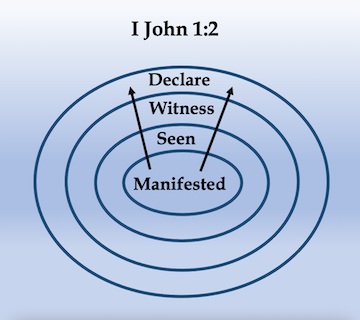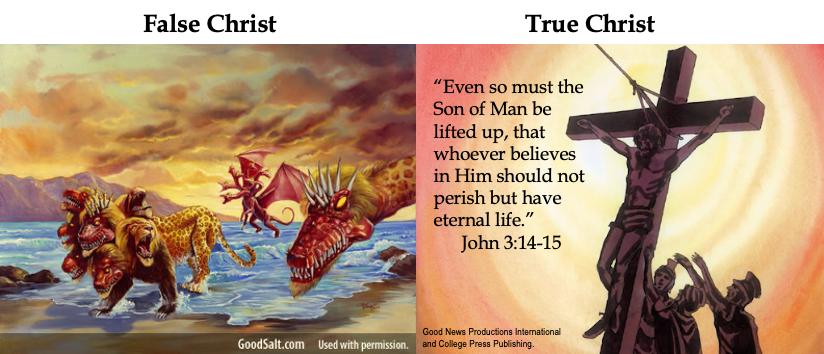“He who believes in Him is not condemned; but he who does not believe is condemned already, because he has not believed in the name of the only begotten Son of God.” John 3:18
As I have shared the gospel with others one of the disturbing questions among non-Christians is how can a loving God send anyone to hell? To many people this seems like a major contradiction. One minute, preachers will talk about God’s love and forgiveness. Then they turn around and talk about hell – a terrible place of torment and unending fire where people want to die but they are unable to. How can God claim to be such a pro at love and forgiveness and then turn around and send someone to such a terrible place of agony and suffering?
How do you respond to this question? Let’s turn in our Bibles to John 3:16-21 where Jesus is having a conversation with a religious leader named Nicodemus. We have been doing a verse-by-verse study of the gospel of John. This book helps us see the major emphasis of Jesus’ ministry. While Christ was on earth, He was not scaring people out of going to hell with bad news; instead, He was inviting people to heaven with good news. Jesus spoke more about hell more than anyone else in the Bible, but that was not the major emphasis of His ministry. He did not earn His reputation as a “friend of sinners” by being harsh. He earned it by being loving and kind and extending His love and forgiveness to people like all of us. Jesus’ message and ministry were not trying to scare people out of hell; but inviting them to receive the gift of eternal life so they could live with Him in heaven.
GOD’S LOVE WANTS ALL PEOPLE TO LIVE WITH HIM IN HEAVEN (3:16-17). 3:16: We looked at this verse in the last chapter. God loves the entire world – over 8 billion people! How do we know this? Because He “gave” His only perfect Son to die on a cross. Why did Jesus have to die? Because God is holy and perfect. The fact that God is holy and perfect demands that He must punish sin (Ps. 5:4-5; 11:5; 45:7; Prov. 6:16-19; 8:13; Isa. 6:1-5; Rom. 6:23b; Heb. 1:9). A “slap on the wrist” is not enough. Due to its awful nature, sin is punishable by death. Not physical death – but eternal death or separation from God (Mark 9:43-48; Rev. 20:15).
Fortunately for us, God let His perfect Son, Jesus Christ, who never knew any sin – no wrong thoughts, bad words, unkind attitudes, or evil actions – die on a cross where you and I should have been punished (2 Cor. 5:21; I Pet. 3:18). Christ took our place on a cross. The nails that should have been driven through our hands and feet, were, instead, driven through His. Keep in mind, Christ didn’t have to suffer for your sin – He loved you enough to do it. When God brought His Son up from the grave on the third day, He was providing proof that He could now extend forgiveness and eternal life to “whoever believes in” Jesus. There is no sin that Christ cannot forgive and no person that He will not accept if he or she comes to Him on His terms.
The word “should” communicates the fact that the verbs “perish” (apolētai) and “have” (echē) are in the subjunctive mood, which expresses a condition. [1] Christ is guaranteeing that “whoever believes in Him” will “not perish” in hell but “have everlasting life” both now and forever.
3:17: This is the heart of God. God the Father’s purpose in sending “His Son into the world” was not to “condemn,” but that the world might “be saved” through Jesus. Condemnation and salvation in this verse are parallel to perishing and everlasting life in 3:16. The salvation and condemnation Jesus speaks of here are eternal. [2]
Some people confuse Christianity with religion. They think God sent Jesus to earth to make us miserable. They think Christianity is a bunch of dos and don’ts. “Don’t drink… don’t cuss… don’t smoke… don’t chew… and don’t run around with girls who do.” They perceive God to be sitting up in heaven just waiting to hit them with His holy hammer when they mess up. But this verse tells us the very opposite. God did not send His Son into the world to “condemn” us, but to cleanse us. He did not come to rub our sin in, He came to rub it out.
Imagine for a moment one of your children when they were small, playing in the road. You see a fast-moving car approaching. You know you can’t reach them in time. Running toward them you yell, “Get out of the road and come here!” It is important at that moment that your child trusts you and responds. Are you trying to ruin their fun? No, you are trying to save their life. God knows that we are all in danger. We are in danger of spending eternity separated from Him. The Bible calls it the second death and it is racing toward all of humanity (Rev. 20:6, 11-15). For that reason, God sent His Son to die on a cross, as a sacrifice for our sins. He has paid our penalty if full (John 19:30). All He asks in return is that we believe or trust in Christ alone for His gift of eternal life.
God doesn’t want any human being to spend eternity in hell. In fact, Jesus tells us that hell was intended for the devil and his fallen angels: “Then He will also say to those on the left hand, ‘Depart from Me, you cursed, into the everlasting fire prepared for the devil and his angels.” (Matt. 25:41). Since God did not want us to spend eternity in hell, He sent His Son to die in our place so that whoever believes in Him should not perish but have everlasting life.
I like how author Max Lucado describes God’s love: “One of the sweetest reasons God saved you is because He is fond of you. He likes having you around. He thinks you are the best thing to come down the pike in quite a while… If God had a refrigerator, your picture would be on it. If He had a wallet, your photo would be in it. He sends you flowers every spring and a sunrise every morning. Whenever you want to talk, He’ll listen. He can live anywhere in the universe, and He chose your heart. And the Christmas gift He sent you in Bethlehem? Face it, friend. He’s crazy about you!” [3]
If God is so crazy about us, then why would He send anyone to such a horrible place as hell? Please hear this – God doesn’t send anyone to hell. People send themselves there.
GOD’S LOVE ALLOWS PEOPLE TO CHOOSE BETWEEN HEAVEN AND HELL (3:18). 3:18: “He who believes in Him is not condemned; but he who does not believe is condemned already, because he has not believed in the name of the only begotten Son of God” (emphasis added). Three times Jesus uses the word “believe” in this verse to indicate that believing in Him is all that is necessary to escape eternal “condemnation.” No other condition is required to be rescued from this everlasting condition. Why then do Christians so often teach that more is required? Do they know better than the Lord Jesus Christ about what it takes to escape such a horrendous fate!?! Of course not. But Satan knows his fate and he wants to deceive as many as possible to join him in the lake of fire forever.
A person “who believes in Him is not condemned” now or in eternity because Jesus took his or her condemnation when He hung on a cross. The believer “shall not come into judgment” because Christ already took the judgment of God on Himself when our sins were placed upon Him (John 5:24; cf. 2 Cor. 5:21; I Pet. 3:18).
When a person refuses to believe in Jesus Christ, they are rejecting God’s offer. They are condemning themselves. [4] When a person refuses to believe in Christ alone for the free gift of eternal life, they are in essence saying to God, “I reject what Jesus Christ did in my place as my Substitute.” Therefore, God has no choice but to let us pay for our own sin through eternal separation from Him in what the Bible calls hell or the lake of fire (Mark 9:43-48; Rev. 20:15). Those who go to hell are going there of their own choosing because they have rejected Christ and His free offer. God has not rejected them; instead, they have rejected God.
Suppose God blessed you and your spouse with a little boy. You love that little boy so much that you would do anything for him. Forbid the thought, but suppose that when your little boy is twenty-one, he begins a wayward life and eventually murders someone. Your state sentences him to die by lethal injection. Suppose that you could walk into his cell the morning he is to be executed and offer to take his place. That’s how great your love is for him. In so doing, you explain that he can be a free and forgiven man. Much to your surprise, he pushes you aside, walks to the table, and receives the punishment for his horrible crime himself. Did you not love him enough? Would you accept the accusation, “If you really loved your son, you wouldn’t have allowed that to happen”? Hardly! You did not reject him; he rejected you.
This is why the Bible puts the responsibility where it belongs when it says, “He who does not believe is condemned already, because he has not believed in the name of the only begotten Son of God” (3:18b).
“Salvation from sin and judgment is free for the taking. But if you reject the miracle cure that the doctor offers you, don’t blame him when you succumb to your fatal illness.” [5]
Why would someone reject Christ’s free offer of everlasting life? Why would someone choose hell instead of heaven? The answer is in verses 19-20:
PEOPLE LOVE THEIR SIN MORE THAN THE SAVIOR (3:19-21). Jesus explains. 3:19: “This is the condemnation, that the light has come into the world, and men loved darkness rather than light, because their deeds were evil.” The presence of God’s light – His truth- forces people to make a choice – to either believe in Christ or reject Him. The reason people reject Christ’s offer of a free gift is because they love their sin more, and they want to stay in the darkness because it hides their sinfulness.
Let’s be honest – sin is fun. Sin feels good. Sin initially appears attractive. But sin is like a black widow spider. The bite of the female black widow spider can be deadly to humans. But the black widow gets its name because after the male has mated with the female, she kills and eats him. Sin has somewhat of the same effect on us. It is attractive and pleasurable, but in the end, it can devour us forever.
For example, suppose a person is unwilling to come to Christ because he is afraid of what God might do with the sins he enjoys? If that man so enjoys his immorality or drug abuse or overeating and, in fear of what God might do, is unwilling to come to Christ, he needs to examine Jesus’ words: “29 If your right eye causes you to sin, pluck it out and cast it from you; for it is more profitable for you that one of your members perish, than for your whole body to be cast into hell. 30 And if your right hand causes you to sin, cut it off and cast it from you; for it is more profitable for you that one of your members perish, than for your whole body to be cast into hell.”(Matt. 5:29-30).What does Jesus mean here?
Let me explain where I’m at in my understanding of this passage. Alcoholism, drug abuse, pornography, and sexual addiction are examples of sins which dominate the lives and thinking of millions upon millions today. People turn to such things because of inner pain. The sinful addiction provides a temporary distraction. However, it does not eliminate the pain. In fact, it takes more and more of the addictive behavior to keep masking the pain.
People can also turn to things like sports, work, home decorating, shopping, recreational activities, and hobbies to distract them from inner pain. These things, although morally neutral in moderation, can so dominate a person’s time and attention as to become idolatrous and sinful. Evangelist Larry Moyer writes: “Have you ever met a man whose hand was so involved in business that there was no time to think about spiritual things? Or a woman whose eyes were so focused on a neat or new home that she neglected spiritual matters? Christ’s warning to a person in that position was: None of those are worth eternal separation from God. Such a person would be wise to cut off the hand with which he works or to pluck out the eye with which she focuses on a new home.” [6]
No one can come to faith in Christ unless they see their need for Him. People with sinful addictions often cannot see that need unless they hit bottom and give up the addiction. Turning from sins is not a condition of salvation. However, for some it may be a practical necessity – not to clean up their lives, but to be able to see their need and come to faith in Christ. Jesus is telling us in Matthew 5:29-30, that nothing is worth going to hell over. What your “hand” touches and what our “eye” sees – does it keep us from believing or trusting in Christ alone for eternal life? We would be wise to cut off the “hand” or pluck out the “eye.” It is far better to be here with “one… hand” or “eye” than separated from God in hell with two hands or eyes.
Some people won’t let God love them because they will be exposed for what they really are – sinners in need of God’s love and forgiveness. This is especially true with religious people like Nicodemus. They live their lives being basically good, but if an invitation to trust Christ alone for salvation is given, they won’t respond because they are afraid their image will be shattered. They will be exposed and that is just too much to risk. But friends, love is risky. We take a risk receiving God’s love through Jesus Christ and we take a risk expressing our love back to Him.
3:20: The words “everyone practicing evil,” can apply to Christians and non-Christians. [7] The phrase “come to the light” “is a flexible expression that refers to association with the light. Even unbelievers can associate with the light. John 6:60-64 states that some of His disciples did not believe in Him. They came to Him and followed Him, but they did not believe in Him.” [8]
Non-Christians who refuse to come to the light offer many excuses for not believing in Christ. “Some cite the presence of hypocrites in the church. Others claim inability to believe some of the truths about Christ or the gospel. [Many say that they cannot accept the fact that God permits so much suffering in the world.] These are merely attempts to conceal a heart in rebellion against God. The ultimate reason people do not come to Christ is that they do not want to.” [9]
Both Christians and non-Christians “will only come to the light if they are willing to allow the light to expose their evil deeds. This happened often as Jesus preached to crowds. He revealed wrong attitudes and wrong actions. People would not come to hear Him if they were unwilling to have their evil exposed.” [10]
We all dislike being shown that we are wrong. I feel that way myself. I don’t like to admit I am wrong. This verse is saying that this normal human reaction is part of our sinful nature. That is why nobody wants to change. Nobody wants to admit he is wrong. When the Republicans are in power, they try to convince the Democrats they have been wrong, but they won’t admit it. When the Democrats are in power, they try to convince the Republicans they have made the wrong choices, but they won’t admit it either. Nobody wants to admit they are wrong. That is why it is so hard to change.
If you are a Christian and you have drifted away from God, you don’t like to be around believers who are walking with the Lord because it exposes your sinfulness, and you start to feel uncomfortable. That is the Holy Spirit convicting you. It is not the committed Christian doing that. It is God inside of you nudging you to come back into the light. So, what do we do? We withdraw from committed believers and hang out with those who have no commitment to Christ. One of the ways we can tell that we are walking in darkness is by our lack of time with committed Christians. At first, we miss a Sunday. And then another and another. We don’t want to be exposed to the light of God’s Word because then we will have to face our sinfulness.
One night, after he had gotten ready for bed, Beverly Dillard’s husband went out to the driveway to retrieve some work papers from his car. Since it was dark, he figured no one would see him make the quick run in his underwear. And he probably would have made it, too—if not for the motion-sensor light, which illuminated him, just as he reached the car door. Christian, you may try to live in the dark for a time, but eventually the light of God’s Word will detect your sinful activity and expose it. Don’t get caught without the covering of God’s forgiveness. Be honest with the Lord and confess your sin so you can resume walking in the light with Jesus without being afraid of exposure (cf. I John 1:9).
The next verse is not distinguishing believers from non-believers as many mistakenly assume. It is distinguishing believers who confess Christ openly, like John the Baptist (3:22-36), and secret believers, like Nicodemus (3:1-20). [11] 3:21: The phrase “comes to the light” refers to the person “who does the truth.” He comes to the light “that his deeds may be clearly seen, that they have been done in God,”meaning that they have “been produced by God.” This verse is referring to Christians. [12] Verse 20 referred to both Christians and non-Christians. But this verse refers specifically to believers. And it is saying that if we will do (not just say the right words but start doing) the right things, despite our dislike of being shown to be wrong – if we are willing, in other words, to begin to obey the truth even though it means we have to admit we have been wrong – then we will find ourselves being drawn to Jesus, for He is the Light. And if we are doers of the truth of God’s Word, then we will openly identify with the light of Jesus Christ so that our works can be seen as being produced by God’s grace working in our lives.
When we are living the way God wants us to live, we will have more boldness to openly confess Jesus Christ before others whether they know the Lord or not; whether they are receptive to Christ or not. But when we are not living in a way that pleases the Lord, we are less likely to openly identify with Him because we are feeling guilty and ashamed.
John the Baptist is a believer who “does the truth and comes to the light” by boldly expressing his convictions about the Lord Jesus Christ (John 1:15-18, 29-34; 3:22-36). Jesus is warning Nicodemus, who came “by night” (3:2), to come to Him “by day” now [13] by boldly confessing Christ which would be contrary to many of the other believing Pharisees (cf. 12:42-43).
TO SUMMARIZE: How can a loving God send anyone to hell? He doesn’t. People send themselves to hell by rejecting God’s free offer of eternal life through Jesus Christ. Why? Because they love their sin more than the Savior.
Some of you reading this may be afraid to come to Jesus Christ because of mistakes in your past that still haunt you. You are afraid He will condemn you instead of cleanse you. There is no wrong too great for Jesus Christ to forgive. When I came to Christ as a filthy sinner back in 1979, I was met with compassion, not condemnation. Christ forgave me and accepted me as His own when I believed in Him for His gifts of eternal life and forgiveness. And He helped me to put all my wrongdoings behind me. For the last forty-four years, I’ve been living in forgiveness. If He forgave me, He will forgive you, too. One of the most exciting things about the Christian life is not simply knowing I have been forgiven and I am going to heaven, although that is enough. But since I have come to Christ, I know He is with me all day every day. Disappointments don’t seem nearly as big, and bad days don’t seem nearly as bad with Him there.
Years ago, a young man had a verbal argument with his father and left home. He continued to keep in touch with his mother, and wanted very badly to come home for Christmas, but he was afraid his father would not allow him. His mother wrote to him and urged him to come home, but he didn’t feel he could until he knew his father had forgiven him. Finally, there was no time for any more letters. His mother wrote and said she would talk with the father, and if he had forgiven him, she would tie a white rag on the tree which grew right alongside the railroad tracks near their home, which he could see before the train reached the station. If there was no rag, it would be better if he went on.
So, the young man started home. As the train drew near his home; he was so nervous he said to his friend who was traveling with him, “I can’t bear to look. Sit in my place and look out the window. I’ll tell you what the tree looks like and you tell me whether there is a rag on it or not.” So, his friend changed places with him and looked out the window. After a bit the friend said, “Oh yes, I see the tree.” The son asked, “Is there a white rag tied to it?” For a moment, the friend did not say anything. Then he turned, and in a very gentle voice said, “There is a white rag tied to every limb of that tree!”
That, in a sense, is what God is saying to us in John 3:16-21. God has removed the condemnation and made it possible to come freely and openly home to Him. Will you come home to the Lord now? God does not want any human being to spend eternity in hell. He loves us too much to send us there. We send ourselves to hell by refusing to believe in Christ to get us to heaven. We can run every stop sign, ignore all the warnings, discount all the pleas to change our minds about whatever is keeping us from trusting Christ, and we can choose the path toward destruction. Sunday School teachers can tell us, TV evangelists can preach to us, pastors can warn us, Christians on social media can share with us, the Bible on a hotel nightstand can inform us, but it is our choice to ignore every warning, or we can take them to heart.
My friend, it is still not too late. You can settle this issue right now. Simply take God at His Word when He says, “He who believes in the Son is not condemned” (John 3:18). If you are persuaded that Jesus was speaking the truth in this verse and is therefore worthy of your trust, you can tell God this through prayer. But remember, praying this prayer is not what gets you to heaven. Only believing in Christ alone for eternal life gets you to heaven. This prayer is simply a way of telling God you are now trusting in His Son.
Prayer: Dear God, thank You for showing me that my sin created a barrier between You and me. Thank You for loving me so much by sending Your only perfect Son, Jesus Christ, to suffer the penalty of my sin by dying in my place on a cross and rising from the dead so that barrier could be permanently removed. As best as I know how, I am now believing or trusting in Jesus alone (not my good life, my religion, or my prayers), to forgive all my sins and rescue me forever from eternal condemnation. Thank You for the forgiveness and freedom from eternal condemnation I now have. In Jesus’ mighty name, I pray. Amen.
FOOTNOTES:
[1] Wilkin, The Grace New Testament Commentary, Kindle Edition, pg. 186.
[2] Ibid.
[3] Max Lucado, Charles Swindoll, Anne Graham Lotz, Henry & Richard Blackaby, The Glory of Christmas: Collector’s Edition (Nashville: Thomas Nelson, 1999), pg. 55.
[4] Swindoll, Insights on John, pg. 74.
[5] Evans, The Tony Evans Study Commentary, pg. 2209.
[6] Larry Moyer, The Toolbox, Aug-Oct 1989.
[7] Wilkin, The Grace New Testament Commentary, Kindle Edition, pg. 187.
[8] Ibid.
[9] Constable, Dr. Constable’s Notes on John, pg. 108 cites The Nelson Study Bible (Nashville: Thomas Nelson Publishers, 1997), pg. 1764.
[10] Wilkin, The Grace New Testament Commentary, Kindle Edition, pg. 187.
[11] Zane C. Hodges, “Coming to the Light—John 3:20-21,” Bibliotheca Sacra 135:540 (October-December 1978):314-22.
[12] Wilkin, The Grace New Testament Commentary, Kindle Edition, pg. 187.
[13] Hodges, Faith in His Name, pp. 65-66.








